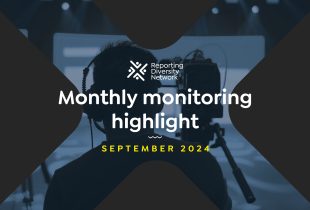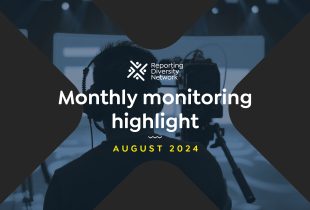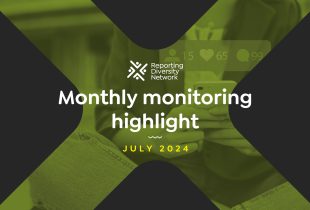News

Monthly Monitoring Highlights September: Ethnic and religious divisions alongside sexism in the Western Balkans
During September, the RDN monitoring team detected a range of hateful narratives and discourse fueled by religious and ethnic discrimination and sexism. Religious discrimination in Montenegro On the 4th of September, portal Borba published an article from the unregistered portal Srpska 24, titled ‘Concert for Nermin – Islamization of Podgorica’, in which ethnic and national …

TROLL OF THE MONTH: Prime Minister Edi Rama in Albania
The Balkan Troll of the Month is an individual, a group of individuals or a media outlet that spreads hate based on gender, ethnicity, religion, or other diversity categories. The Balkan Troll is selected based on hate speech incidents identified across the Western Balkans region. Prime Minister Edi Rama was questioned during a parliamentary session …

Hate speech and ethnic divisions in an anti-Albanian campaign on social media
An anti-Albanian campaign was launched on social media following a post on Facebook from a suspicious closed account. In the Facebook post, the author, without giving further details, said that at the cash register in the “Kipper” market in Gjorce Petrov, a saleswoman refused to tell the prices of the products in the Macedonian language, …

Empowering journalists for responsible reporting on human rights
September 26-27, 2024 – Mokrin, Serbia Taking another step towards responsible and ethical media reporting on marginalised groups in the Western Balkans, the Reporting Diversity Network hosted an impactful training for journalists from September 25 to 27, 2024, in Mokrin, Serbia. This initiative, organised by the Media Diversity Institute Western Balkans in collaboration with the …

Music and Hatred: How a Song Caused Ethnic Tensions at a Student Party in Skopje
A student party in Skopje in Spring took an unexpected turn when the playing of an Albanian song towards the end of the event sparked controversy and hate speech on social media. A nationalist group named “Patriotsko drushtvo” (Patriotic Society), self-proclaimed as a “young, ambitious group of patriots filled with enthusiasm,” criticised the inclusion of …

REGIONAL MEDIA MONITORING: Ethnicity and gender identity remain the main targets of hate speech as political targeting is on the rise
Reporting Diversity Network has been continuously conducting media monitoring of hate speech on a regional level for almost four years. Our latest set of reports show findings from May 2022 until December 2023. Gender identity and ethnicity remain the most targeted identities, as more than half of all recorded cases across the region referred to …

TROLL OF THE MONTH – SELECTION CRITERIA
The goal of the Reporting Diversity Network 2.0 monitoring is to identify and document the most significant cases (‘incidents’) of hate speech and divisive discourses in the Western Balkans media. Incidents are defined by the speaker regardless of where they occurred, but monitoring refers to their media coverage. They can originate in the Parliament, party …

Women may be beautiful, but is that really a topic for discussion in Parliament?
This raises a critical question about how we perceive and treat women in the public sphere, particularly women in politics. Once again, we witness how seemingly harmless comments, such as calling a woman “beautiful,” reveal deep-seated sexism that continues to undermine their participation in public life. In a recent session of the Serbian Parliament, a …

Monthly Monitoring Highlights August: Ethnic and religious divisions, attacks against the media, journalists, and activists
During August, the RDN monitoring team detected a range of hateful narratives and discourse. This month, we’ve witnessed hate fueled by ethnic and religious divisions, coupled with targeted attacks against the media, journalists, and activists. Ethnic hate in North Macedonia and Albania This month in North Macedonia, social media users called for the boycotting of …

TROLL OF THE MONTH: Media coverage of Imane Khelif
The Balkan Troll of the Month is an individual, a group of individuals or a media outlet that spreads hate based on gender, ethnicity, religion, or other diversity categories. The Balkan Troll is selected based on hate speech incidents identified across the Western Balkans region. The Paris Olympic Games, albeit a moment to celebrate diversity, …

Monthly Monitoring Highlights July: Relativisation of obstetric violence, sexism and ethnic tensions
Throughout July, the RDN monitoring team has detected a range of hateful narratives and discourse. This month, we have seen the dangerous revitalisation of obstetric violence alongside hatred based on ethnicity and gender as well as hatred against journalists. Revitalisation of obstetric violence in Serbia In the morning show on TV Prva the Minister for …
